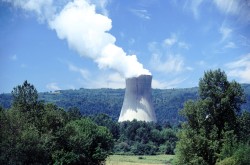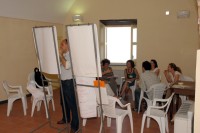Citizens’ engagement in designing future scenarios for nuclear waste management in France
Contact:
Luis Aparicio, ANDRA, France, Luis.aparicio@andra.fr
This case study searches for a appropriate method to engage citizens in designing future scenarios for nuclear waste management in France. The participants will advise a state agency, the French National Agency of Radioactive Waste Management (ANDRA), on how to organise participatory exercises that will involve the local population in the management of nuclear wastes.
Short description of the case
The participants will advise a state agency on how to organise participatory exercises that will involve local populations in the management of nuclear wastes. They will be asked:
- To define the frame in which local participation can take place according to the agency objectives and constrains.
- To make clear the objectives of public participation.
- To propose initiatives for the citizens’ engagement in the scientific, technical and social aspects of a project concerning high-activity and long-life nuclear waste management.
This case corresponds to a real demand of the French National Agency for Nuclear Waste Management (ANDRA) in relation with the current studies about the conception of a deep geological repository.
Training objectives
Participants will learn:
- To take into account the importance of institutional conditions in designing deliberative processes.
- To consider the existing tension between framing and overflowing in decisional process at multiple levels (local and national).
- To deal with the difficulties of designing a participatory initiative with affected population on a complex socio-technical issue.

This case is especially devoted to project consultants of public participation in relation with policy decisions about science and technology issues. It can be of great relevance for people interested in the institutional aspects of public participation or willing to reflect on these topics.
Training Method
- Introduction to the exercise
- Participants work in small groups on the three tasks mentioned above
- Each group present their first conclusions and discuss with ANDRA’s representatives in plenary
- Work in groups on the main elements and the rationale for a participation programme to be addressed to the French National Agency for Nuclear Waste Management
- Presentation of the programme and general discussion in plenary.

Previous knowledge required:
Participants should be acquainted with the issue at stake well in advance. A fairly good knowledge on the topic of public participation in science and technology in general is also necessary (see case study resources and CIPAST resources at www.cipast.org).
Guideline on how to work with the case study
1. Read: the ID card Nuclear Waste Management [15.4 kb, pdf]
A. INTRODUCTION
2. Read A1: the PPP Introduction of ANDRA (A1) [1.2 mb, pdf] and the purpose of the workshop.
3. Read A2: the working material on Nuclear Waste Management [138.4 kb, pdf].
4. Read for more information on ANDRA: www.andra.fr
B. FRAMING
Divide – if necessary – in two groups.
5: Define the problem. Use the following guiding questions:
- Identify the obstacles associated to the Agency missions. Which are the main limits of ANDRA’s action (external but also internal)?
- One can say that political decisions result from struggles in multiple arenas (economic, scientific, regulatory, mediatic…). The importance of each particular arena is, however, variable. Some are more relevant than others for a particular issue in a particular stage. According to that, how would you characterise the current frame of the HAVL project? Which are the dominating arenas?
6: Present the result of the framing in plenary.
7: Read B1: Possible answers to the guiding questions to achieve your mission [12.8 kb, pdf]
C. DEFINE THE ACTORS
Split in small groups again.
7: Define the actors involved, their stakes and the objective for public participation. Write them on a flip chart and discuss them together.
D. DESIGN THE PARTICIPATIVE PROCESS
8: Design a participative process. Use the following guiding questions:
- In your view, what should the participatory initiative of Andra be intended for?
- Which issues might be open to consultation (or should not) with local population?
- How might the local population take part in the process of zone restriction? Should they? How? According to which criteria could this zone be defined?
- Which topics are more likely to be appropriated by the local population? How would you deal with the topic of technical complexity in your proposal? How would you address the issue of nuclear identity?
- What could be the general form of the dossier addressed to the CNDP?
9: Summarise your results and deliver a 5 minute presentation in plenary at the end of the session.
10: Read D1: Possible answers to the guiding questions to achieve your mission [13 kb, pdf]
11: Discuss the outcomes, the pros and cons of every proposed participatory process.
E. EVALUATION
12: Please fill in E1: the handout participants impressions: positive and negative about this case workshop [12.7 kb, pdf]
F. SCHEDULE (based on Procida workshop):
| Start | End | Activity |
|---|---|---|
| 9:00 | 9.15 | Introductory PowerPoint |
| 9.15 | 9.30 | Questions and clarifications |
| 9:30 | Split into groups | |
| 9.30 | 10.00 | Read the working documents |
| 10.00 | 10.45 | Frame the problem |
| 10.45 | 11.00 | Plenary synthesising session on the framing of the problem |
| 11.00 | 11.15 | Break |
| 11.15 | 12.00 | Group work: define the actors, their stakes and the objective for public participation |
| 12.00 | 13.30 | Group work on the design of a participative process |
| 13.30 | 14.00 | Plenary presentation and discussion of the results and evaluation |


